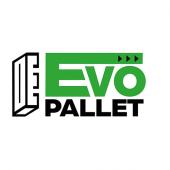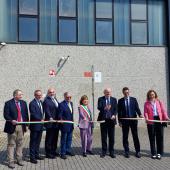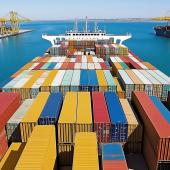Sustainability. Granarolo’s point of view
Green supply chain strategies and circularity for a dairy product where quality is intertwined with ethics.
M. Costanza Candi, Luciana Guidotti
Granarolo Sustainable Transition is a path that sees sustainability as a circular process that involves every aspect of the supply chain, from production to the shelf. A project that the Bologna-based dairy company told ItaliaImballaggio about, highlighting the different nuances of a long-term program, in which all the Group’s strategic functions play a leading role. We talk about it with Myriam Finocchiaro, as head of communication, external relations and CSR.
Granarolo’s figures give a sense of the impact that an initiative of this kind can have on the climate and CO2 emissions, given that we are talking about an action that directly involves over 600 stables, 13 plants in Italy and 9 abroad, widespread distribution for a 2020 turnover of 1,280 million euros.
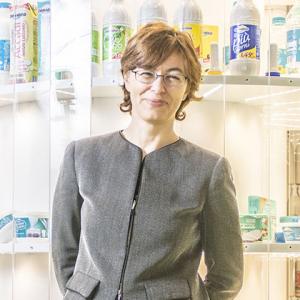
A cooperative industrial model
The conversation starts by looking at sustainability - seen as a theme whose value is now fully assumed by public opinion - to define the relationship between the increasing sensitivity of consumers and the role of innovation played by the large agri-food players committed to reducing CO2 equivalent emissions for many years.
A topic on which Finocchiaro says: «For many years, also thanks to studies on the product life cycle (LCA), the Granarolo Group has been working on reducing the environmental impact during the processing of raw materials and the distribution of finished products, but the most important contribution, as we have known for some time, must come from the work in the field and in the barn. The Farm to Fork strategy has the merit of having urged the institutional and entrepreneurial world to intervene in a more decisive manner, as a matter of urgency, by providing incentive systems, also transferred to the world of finance. At the same time, innovation in the agro-food sector has made giant strides in just a few years. We have therefore recently decided to involve the entire chain of breeding partners in a process of change, the Granarolo Sustainable Transition. This is a program of ecological and fair transition of the supply chain of the 633 members of the cooperative that controls Granarolo S.p.A. With 8.5 million quintals of processed milk, Granarolo is today the most important Italian dairy company and also the supply chain that can make the greatest contribution in terms of reduction of environmental impact.
Granarolo Sustainable Transition is articulated along three axes:
- animal welfare and rational use of drugs at the barn;
- animal feeding;
- reduction of the environmental impact linked to milk production.
In addition to the qualitative and animal welfare indicators, which have been measured for years and are the subject of a continuous improvement project reported annually in the Sustainability Report, there are actions aimed at reducing the environmental impact generated by the barn, working in particular on the feeding of dairy cows, animal welfare and reduction of drugs, agriculture 4.0, management of energy and water sources in the farm, the circular economy of the farm, leveraging on a systemic approach that combines technological innovation and advanced evaluation techniques.
The indicators, methodologies and the path that Granarolo will follow to intervene on aspects related to agriculture and livestock, come from the work started by a Scientific Committee led by the University of Brescia, joined by the University of Milan and the University of Bologna.
The size of the supply chain and the capacity for innovation expressed by many members give us hope that we can finally reach the goal we have set ourselves: to reduce greenhouse gas emissions by 30% for every kg of milk produced by 2030».
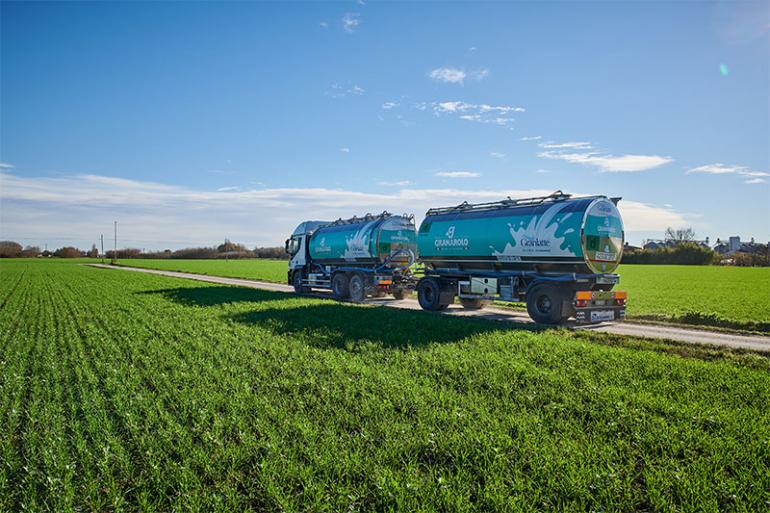
She continues, «We talk about sustainability along the entire supply chain, in a seven-step process: Agriculture and Breeding, Procurement and Ingredient, Processing and Packaging, Innovation and Marketing, Distribution, Consumers and Community, and End-of-Life Management».
Granarolo’s numbers are significant, if you think of the 633 farmers distributed in 12 Italian regions, who take care of 60,000 animals, producing 8.5 million tons of milk, with increasingly sustainable strategies.
The transport of raw materials entering the plant, the central distribution hub, is guaranteed by 72 Euro 5 and Euro 6 tankers, which cover 6.9 million km per year. One of these is powered by biomethane, and others will follow.
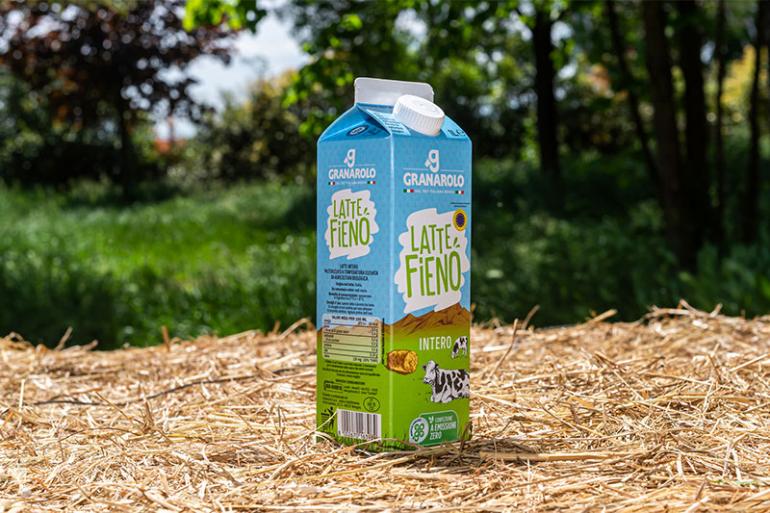
R&D + marketing = functional and sustainable product
In such an extensive supply chain context, defining a strategy to reduce emissions can therefore have an important impact, as can working on packaging, where sustainability means research into new materials, the study of innovative and “responsible” design, ad hoc communication capable of underlining the ethical characteristics and innovation also in support of marketing which, in Granarolo, in fact, works closely with R&D.
«For each phase we have identified sustainability goals consistent with the Green Deal and the 17 SDGs. If we talk about processing and packaging, as an example, it is interesting to see the projects that are able to support the four-year goal in the period 2018-2021, which involves the reduction of 3787 tons of CO2 equivalent. The projects that make it possible to achieve this medium-term goal are reported punctually in the Sustainability Report prepared in the spring of each year. There are some projects that are more significant than others or that have involved a great commitment on the part of Granarolo’s R&D packaging.
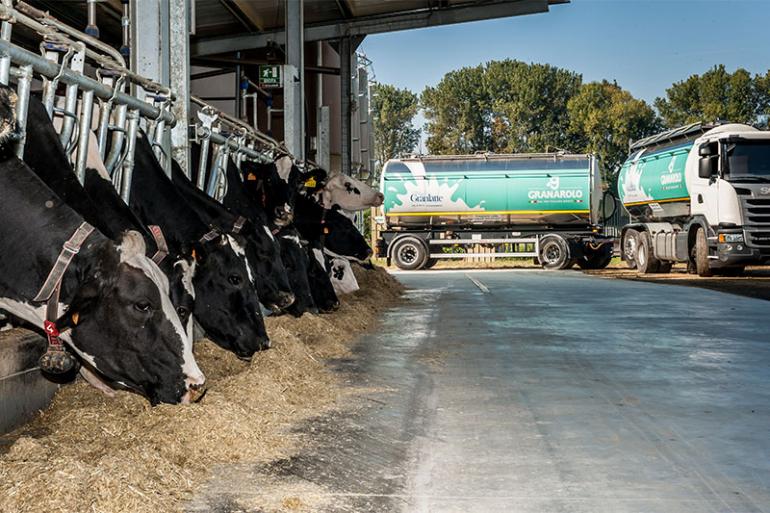
This year, for example, we converted a large proportion of Yomo jars from plastic to paper; by 2021, 66 million jars will have been converted to paper, which, when fully operational, will be 185 million per year.
The launch of the new “Latte e Fieno” reference has led us to choose a packaging consisting of 87% FSC paper and vegetable plastic, making a choice that is consistent with the characteristics of the product.
As far as plastic is concerned, Granarolo aims to reduce the use of non-recyclable polycarbonate in the coming years, preferring PET and rPET. The problem is that in Italy, recycled PET is lacking, since today almost all of it comes from non-EU countries. It is necessary to create an Italian supply chain of rPET. Moving on to design, we think it should be functional first of all. Seven years have now passed since the launch of the Yomino Squeezable, designed to follow the need of the small child to grasp and manage the package of yoghurt independently.
To this ergonomic element, we added an anti-breathing cap, which offered an extra value in terms of safety, not only food safety. In Granarolo, research is constant and based on the target, whether it’s a child or an elderly person.
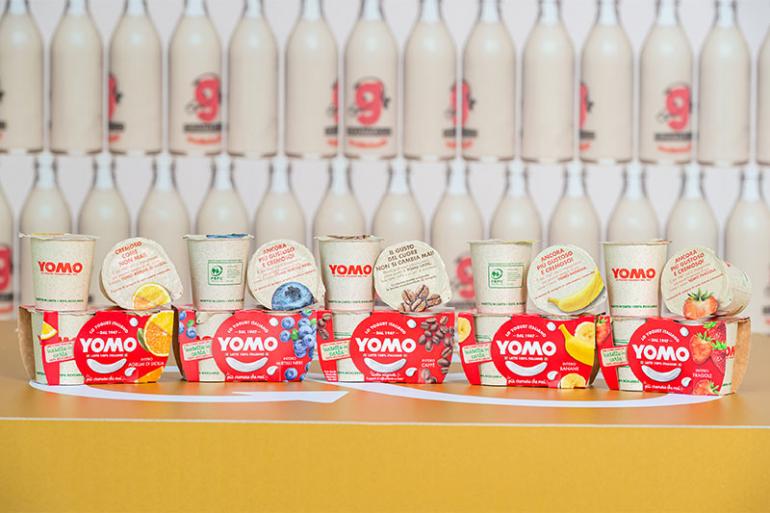
Think of the convenience introduced by our R&D in the resealable packaging of stracchino, which responds to the need to reduce food waste, or that of ricotta, which carries on-pack information dedicated to the end of life of the product, with suggestions on how to use it when it is at the limit of its shelf life. For us, packaging means a “wide view”, because it allows us to convey actions related to shelf-life, making our consumers aware of the fact that a peremptory date or a “preferably by” date changes the way we approach food.
If the product has reached the end of its shelf life, but is well preserved, we suggest smelling it and observing it before throwing it away. In short, packaging becomes an opportunity to aim for a reduction in waste, thanks to the lengthening of shelf-life and tailor-made packages, adapted both to lifestyles and consumption and to good on-pack communication. After the pandemic, consumers have less desire to go shopping; they therefore buy more things that are less perishable in the short term, and this is why packaging must respond accordingly, guaranteeing longer product life. On the subject of anti-waste, we also work with our Shops. The latest in order of time have been inaugurated in Milan - in via Adige - and in Bologna - in via Irnerio -, where we also offer “short date” products, i.e. foods with less than 2/3 of the product life required to be on the shelves of the large-scale retail trade, which are sold in dedicated spaces at attractive prices for those who buy them».
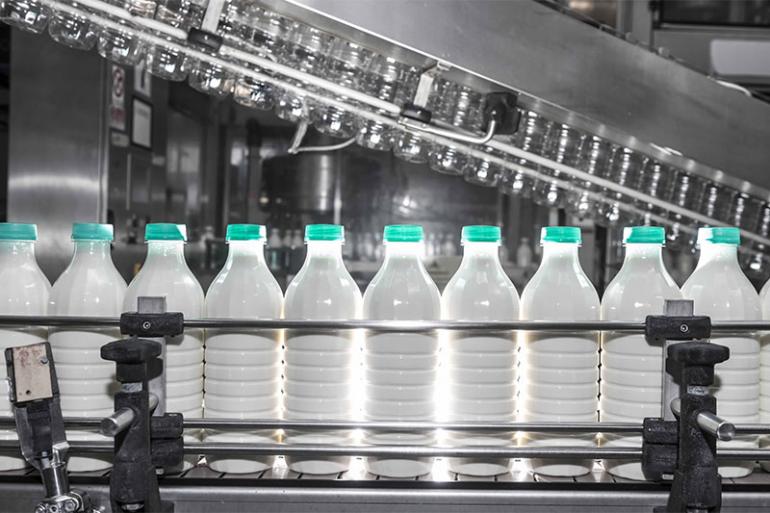
Tangible green, between logistics and retail
Product sustainability therefore has many faces, each of which has an environmental impact that Granarolo tackles with specific actions, including packaging, on the basis of a principle that, in addition to environmental protection, broadens the horizon towards the territory, sociality and safety. This closes a virtuous circle, which also involves new lifestyles and consumption.
And on this point, Granarolo points out: «The pandemic has reduced the purchasing power of families, consumers put taste first, if they have the ability to spend, and price, if availability is lower. Surveys say that sustainability is important to a significant segment, about 40% of consumers, but it comes on top of other elements. Many consumers have written to us congratulating us on the choice of paper in the Yomo jar and I don’t think this sensitivity will be lost, but the scale of values, also as a result of the pandemic, has changed.

R&D and Innovation Granarolo, from whose intuitions derive 20% of the company’s turnover, are always attentive to these trends and are working on the launch of new products, in which packaging also plays a leading role.
All the steps we have mentioned are reported in a Sustainability Report in which, year by year, Granarolo documents the reductions in terms of CO2 equivalent. Within this document, drawn up in compliance with GRI, the international reference standard, there is also other information: details on economic and financial aspects, on the value generated, on the supply chain, on the environmental management aspects linked to processing, packaging and logistics, on the composition of the staff, its training, and the initiatives in favour of the community promoted by the company.
Among these, we would like to mention a project that is unique in many ways: the creation, in synergy with the Policlinico di Sant’Orsola, of a Donated Human Milk Bank, where milk from mothers who have just given birth is collected, pasteurized and donated to children who are struggling between life and death in one of the many Neonatal Intensive Care Units in the Emilia-Romagna region. In a project like this, Granarolo has not only invested financially, but has also made available space, expertise in pasteurization processes, packaging, distribution, people and time».











